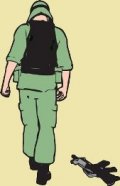In New South Wales there lives a man, a teacher young and true,
Who would not be conscripted in the ballot of the few.
When first they called him up to serve he went along to court
And said “I can not go against the things I have been taught.
“Violence leads to violence and pain and useless tears
Each war has spawned a bigger war these last ten thousand years.
Said the judge “Would you refuse to fight the strangler of your mother?
Come answer this one question now. The court will have no other.”
“I can not call my enemies a people far away
Who've waited now for peace through many a weary night and day,
And the day of peace will never come, the terrors never end
If a government says who must be my foe and who my friend.”
The judge said, “William White, into the army you must go.
Though your case does not convince me, you in action might be slow.
As a cook or as a slushie, as an orderly you'll serve
And help the frontline boys who have a different kind of nerve.”
“An army's not an army except in time of war.
Destruction is the purpose it was created for.
I can not help the military. My flag of hate is furled.
My work is teaching children of the wonders of this world.”
His case and his appeal dismissed, then came the intake day.
To the school and not the barracks he early made his way
And when they came to sack him, his living to deny,
He said, “I want to go back to the class and say goodbye.”
“You'll never go back, William White, into that room again.
You will not farewell them and you will not explain.
Since you will not carry out for us the plans we call defence
Any man who gives you work will be committing an offence.”
Have you heard a politician say that war's the only course?
Have you heard a mad philosopher preach the mind and heart's divorce?
Have you heard the dreadful logic of a hanging judge's speech?
Then you'll know the man to whom you'd say, “Take this child and teach.”
Who would not be conscripted in the ballot of the few.
When first they called him up to serve he went along to court
And said “I can not go against the things I have been taught.
“Violence leads to violence and pain and useless tears
Each war has spawned a bigger war these last ten thousand years.
Said the judge “Would you refuse to fight the strangler of your mother?
Come answer this one question now. The court will have no other.”
“I can not call my enemies a people far away
Who've waited now for peace through many a weary night and day,
And the day of peace will never come, the terrors never end
If a government says who must be my foe and who my friend.”
The judge said, “William White, into the army you must go.
Though your case does not convince me, you in action might be slow.
As a cook or as a slushie, as an orderly you'll serve
And help the frontline boys who have a different kind of nerve.”
“An army's not an army except in time of war.
Destruction is the purpose it was created for.
I can not help the military. My flag of hate is furled.
My work is teaching children of the wonders of this world.”
His case and his appeal dismissed, then came the intake day.
To the school and not the barracks he early made his way
And when they came to sack him, his living to deny,
He said, “I want to go back to the class and say goodbye.”
“You'll never go back, William White, into that room again.
You will not farewell them and you will not explain.
Since you will not carry out for us the plans we call defence
Any man who gives you work will be committing an offence.”
Have you heard a politician say that war's the only course?
Have you heard a mad philosopher preach the mind and heart's divorce?
Have you heard the dreadful logic of a hanging judge's speech?
Then you'll know the man to whom you'd say, “Take this child and teach.”
Contributed by Bernart Bartleby - 2016/2/16 - 15:05
×
![]()
Note for non-Italian users: Sorry, though the interface of this website is translated into English, most commentaries and biographies are in Italian and/or in other languages like French, German, Spanish, Russian etc.











Parole e musica di Glen Tomasetti (1929-2003)
Il lato A di un 45” di questa oggi misconosciuta cantautrice australiana che negli anni 60 fu - prima ancora di Eric Bogle - la voce più importante contro il coinvolgimento dell’Australia nella guerra in Vietnam.
Testo trascritto da Raymond Crooke e contribuito – insieme alla cover - sul suo bel sito Raymond’s Folk Song Page. Anche l’introduzione che segue è di Raymond Crooke, cui il disco della Tomasetti fu regalato da uno zio quando era ragazzo.
Finora era stato possibile reperire in Rete solo il testo del brano sul lato B, The Army’s Appeal to Mothers
This EP recording was produced as part of the Anti-Conscription campaign that took place in Australia during the Vietnam war. My uncle, generally regarded by the family as too left-wing, gave it to me as a Christmas present, much to my parents' displeasure, and I have treasured it ever since.
Canzone dedicata a William "Bill" White, un giovane maestro che nel 1966 divenne in primo obiettore di coscienza australiano, rifiutandosi di partire per il sud-est asiatico. White fu rimosso dall’insegnamento e gli fu ordinato di consegnarsi presso una base militare; lui disse che si rifiutava e che avrebbe aspettato l’arresto nella propria casa; le autorità, in grave imbarazzo (anche perché un gran numero di manifestanti e di giornalisti si erano subito assiepati intorno all’abitazione dell’obiettore), tergiversarono per qualche giorno ma poi mandarono i loro mastini a catturarlo…
Questa la dichiarazione di obiezione di coscienza di Bill White:
Secondly, I am standing against the war itself as a national and international policy. As war, by definition, has always incorporated killing, I would have been opposed to any war on this basis.
On the third front I am opposed to a state's right to conscript a person, I believe very strongly in democracy and democratic ideals... In fact the National Service Act is the embodiment of what I consider to be morally wrong and, no matter, what the consequences, I will never fulfill the term...
Primo, sono contro l’omicidio, l’assassinio… L’etica, secondo me, si fonda sul rispetto della vita. Io rispetto le persone, i loro sentimenti, le loro proprietà ed il fatto che sono tutte eguali, ed è perché ritengo in coscienza che tutte le persone, io compreso, abbiano l’incontestabile diritto a vivere.
Secondo, sono contro la guerra come strumento politico a livello nazionale ed internazionale. Siccome la guerra prevede sempre, per assunto, l’assassinio, mi opporrei proprio per questo a qualsiasi guerra.
Terzo, sono contrario al diritto di uno Stato di precettare le persone per la guerra, credo fermamente nella democrazia e negli ideali democratici… Di fatto il National Service Act è l’incarnazione di questo (abuso) che io ritengo sia eticamente sbagliato e al quale, non importa quali siano le conseguenza, io non adempierò mai.